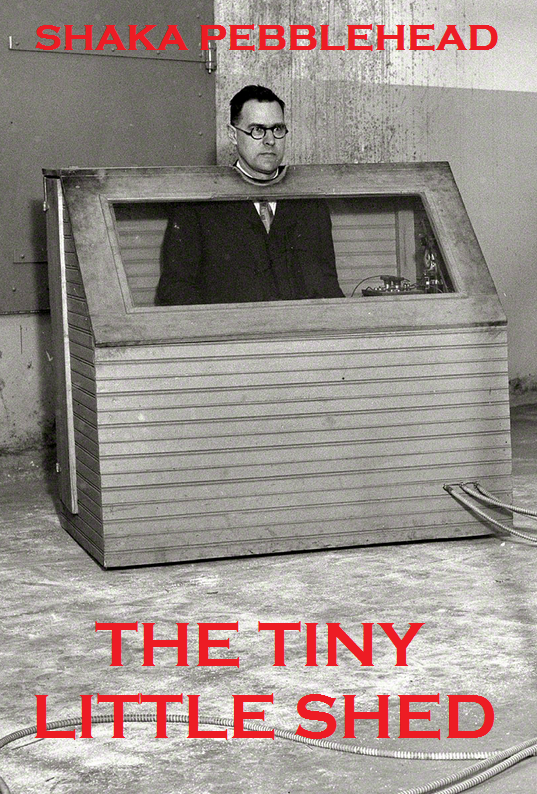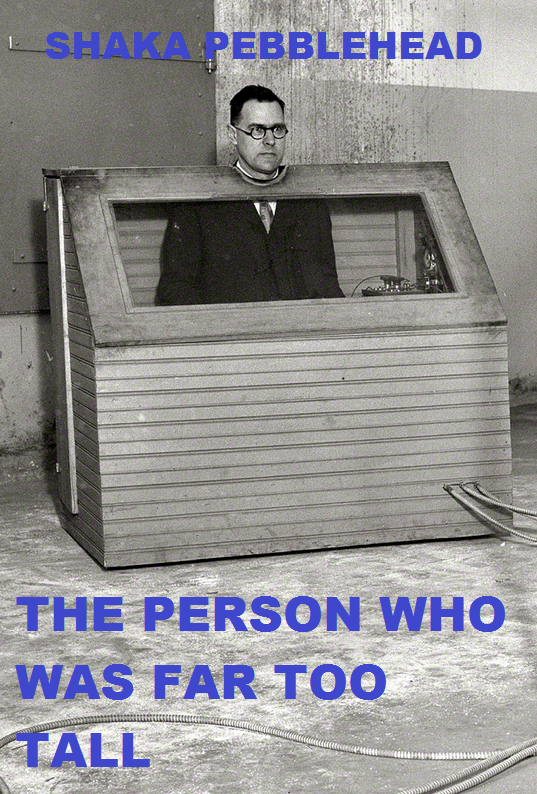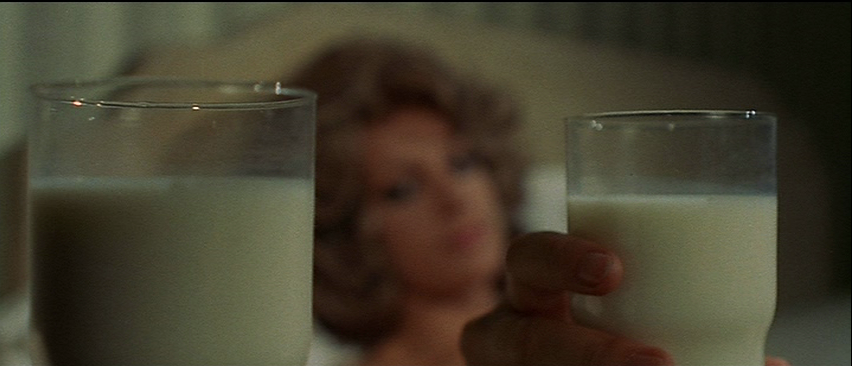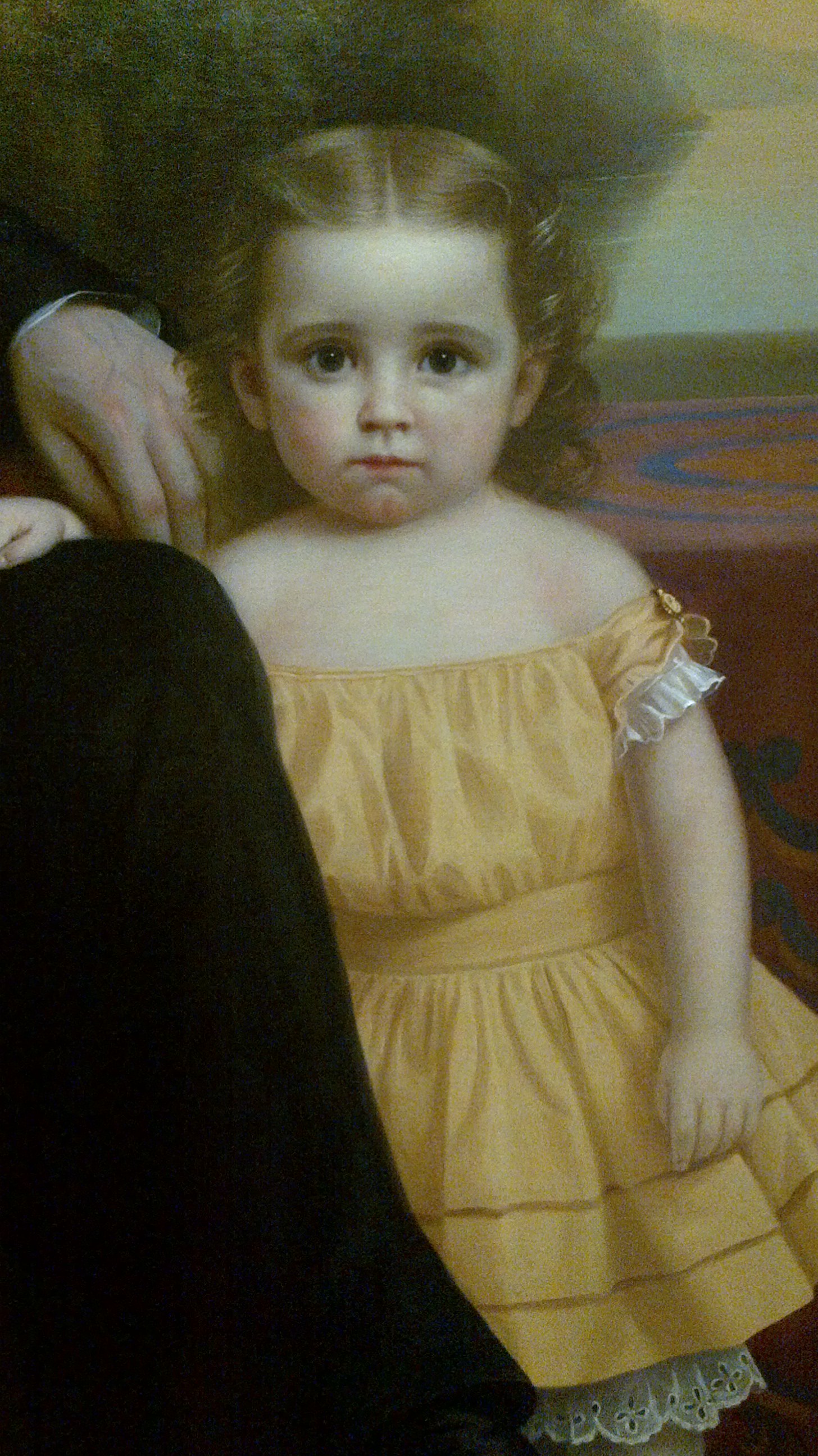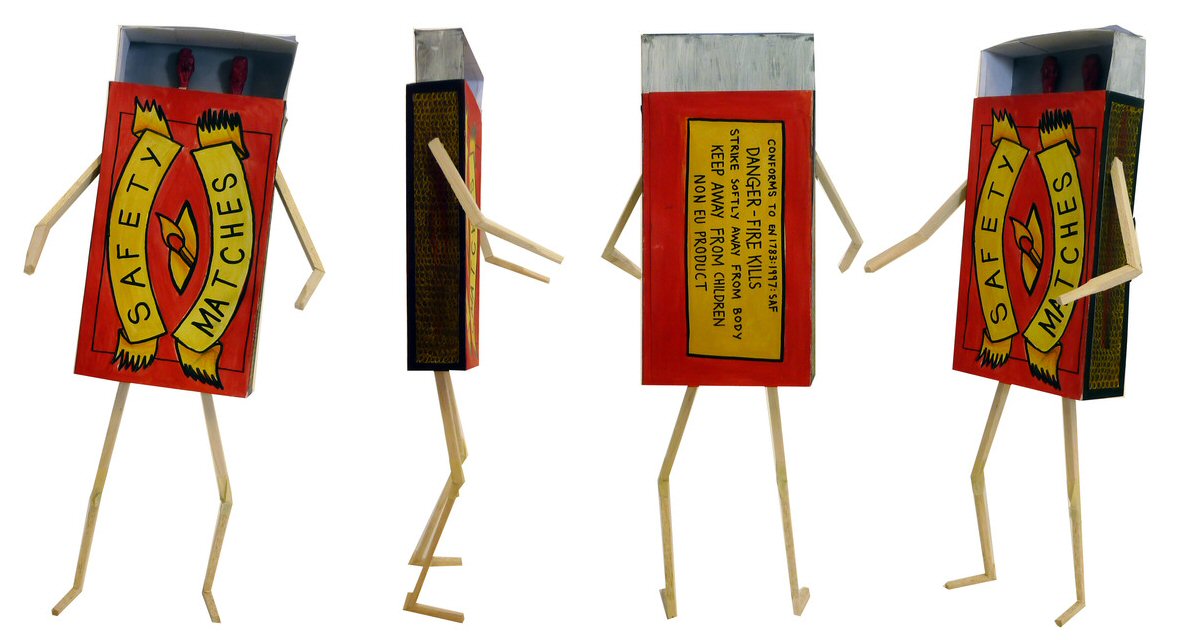
Category Archives: Shaka Pebblehead
Jejune
In her “Mind Your Language” column in The Spectator, Dot Wordsworth turns her attention to jejune. It is one of those words (like fulsome) where an erroneous usage is now so common that the correct, original meaning may be lost entirely. Because of its similarity to juvenile and French jeune, jejune is misused to mean childish, naive, callow. (Dot Wordsworth suggests George Bernard Shaw may be to blame.) This is the (wrong) sense given in the finest use of jejune in cinema history:
What jejune actually means is thin, meagre, unsatisfying. Thank heavens there is at least one man who uses the word correctly. Blockbusting potboilerist Pebblehead has embarked on a new series of gaudy paperback potboilers which purport to be sequels, or prequels, or simply complete rewrites, of acknowledged classics. The first title to appear is Pebblehead’s take on Richard Llewellyn’s 1939 novel How Green Was My Valley. Recalling the privations of his childhood in Pang Hill Orphanage, Pebblehead’s book is entitled How Jejune Was My Gruel. It begins:
How jejune was my gruel. Oh, how jejune it was. I remember so vividly how, when given my bowl of gruel in the orphanage dining hall, I was struck by its jejunosity. Has ever a poor orphan child, who grew up to become an internationally successful bestselling paperbackist, been faced with gruel so jejune? I think not.
A film adaptation of How Jejune Was My Gruel is currently in production, starring anybody the producers can find whose career is not in tatters following allegations of sexual misconduct.

New Pebblehead Paperback Potboiler
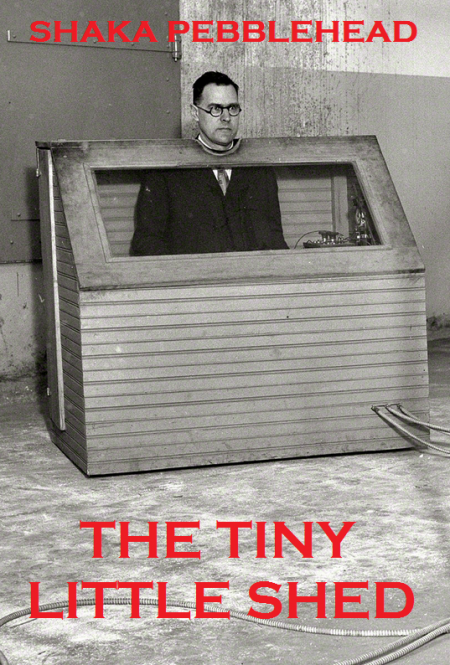
The Raid On Entebbe

The Raid On Entebbe (disambiguation).
The Raid On Entebbe can refer to :
a hostage-rescue mission carried out by commandos of the Israeli Defence Force at Entebbe Airport in Uganda on 4 July 1976;
a 1977 film dramatisation of the incident starring Peter Finch (whose surname is also the common term for medium-sized passerine birds in the family Fringillidae);
the given name of a pet hamster kept by the potboiling paperbackist Pebblehead.
Pebblehead was once asked in an interview why he had named his hamster The Raid On Entebbe. This is what he said by way of reply:
“I don’t know what you’re talking about. I haven’t got a pet hamster. I grant you, there is a small cage over there, fitted with a wheel for a small mammal to run around on like a mad thing, and lined with excelsior, or wood wool, for the comfort of such a small mammal, and, yes, there is a strong hamstery odour in the vicinity of the cage. But I challenge you to show me an actual hamster.”
Thus challenged, the journalist interviewing Pebblehead pointed to what looked undoubtedly like a hamster, nestling in the corner of the cage, almost covered in excelsior, and fast asleep.
“Blimey!” said Pebblehead, “Where did that come from?”
A press statement was later issued on Pebblehead’s behalf by a crack team of brain-doctors.
“For some time now, Pebblehead has been suffering from what the medical profession terms intermittent hamster-blindness. The condition is debilitating and incurable, although the symptoms can be alleviated with a combination of intravenous drugs, eye drops, and frenzied activity, for example, bashing out potboilers on a typewriter at the rate of several novels a week. Incidentally, all of us have previously served as commandos in the Israeli Defence Force, so if you know of any hostages who need to be rescued from African airfields, do drop us a line.”
Pebblehead’s latest potboiler, Invisible Hamster Mayhem!, is now available from all good petshops.
Ogre

We all know that God spelled backwards is Dog, but it is not commonly pointed out that Ergo spelled backwards is Ogre. This insight can lead us to faff about with Descartes’ famous dictum cogito ergo sum so that, instead of stating I think therefore I am, we say instead I think I am an ogre.
It could be argued that this is actually a more profound statement than Descartes’ original. It could be, and it has. In a new book, the paperbackist Pebblehead takes cogito ogre sum as his starting point, and weaves a tale staggering in its implications.
“I am known for my potboilers” said Pebblehead, speaking from his chalet o’ prose high in the Swiss Alps, smoking his pipe, “Fat paperbacks with garish covers sold in bulk at airport bookstalls and the like. With my new book, I like to think I have created an entirely new genre, which I have dubbed the ‘potboiler of profundity’. This is a fat paperback with a garish cover sold in bulk at airport bookstalls and the like which, in terms of deep mind-numbing profundity, can stand alongside the deepest and most mind-numbing and most profound works in the canon.”
Bashed out in just two weeks of frantic typing, Pebblehead’s potboiler of profundity tells the story of a man who thinks he is an ogre. It poses questions which delve into the core of the human soul. If I think I am an ogre, am I an ogre? If I think I am an ogre but I am not an ogre, what, then, am I? Why would I think I am an ogre in the first place? Am I hairy and brutish and savage? Do I grunt rather than speak articulate words? If so, how do I manage to narrate this potboiler of profundity in such punchy prose, daddy-o? Answer me that, or I’ll tear your head off with my bare hands, or rather paws, yes, great hairy paws, suitable for an ogre. And when I’ve torn your head off I’ll carry it back to my lair, a dark dank cave, full of bats, where I lurk, grunting and slobbering, ogreishly.
With your head torn off and tossed on to the pile of other torn-off human heads in the corner of my cave, you won’t be able to continue reading my fat paperback with a garish cover sold in bulk at airport bookstalls and the like, will you? You won’t be able to read, and you won’t be able to think. And if you can’t read and you can’t think, can you still call yourself civilised, or are you, too, now merely an ogre, albeit one without a head? Ultimately, are we not, all of us, wandering the world like headless ogres, searching for our torn-off heads, tossed onto piles of other torn-off heads in the corners of dark dank caves? Is one of those caves Plato’s cave? Was Plato, too, an ogre? And if Plato was an ogre, what of René Descartes? And what of you?
The latest news from Pebblehead is that his own brain has been so bedizened by the writing of his potboiler of profundity that he is currently languishing, exhausted, on the balcony of a sanatorium even higher in the Swiss Alps. His book is available at all good airport bookstalls. We wish him well.
Where Are The Snows Of Yesteryear?
Until yesterday, the snows of yesteryear were being kept in bins in a remote and refrigerated storage facility. Due to a security alert, however, the bins were moved during the night. A fleet of trucks ferried the snow, in the bins, to a secret location. The trucks were refrigerated as, too, we must assume, is the secret location. Because it is secret, I cannot tell you where it is. I don’t even know myself. But what this means is that we cannot answer the question, where are the snows of yesteryear?
Obviously we can answer that they are in a secret, refrigerated, location, but that is hardly satisfactory. The more persistent reporters from the winter weather phenomena press are unlikely to return to their igloo offices only to face the wrath of their white-bearded, icicle-strewn editors. No, they will think up ever more cunning ways to phrase their questions, hoping to trip up the snow authorities.
The snows of yesteryear, where are they?, they might ask, or Yesteryear, the snows of, whatever happened to them? Sooner or later a dimwit on the panel will blurt out the precise coordinates of the secret location, and frenzy will ensue.
Snow frenzy is akin to snow fury, and we are reminded of the bestselling paperback Like A Woman Scorn’d by Ella Snowfury. It was in fact by Pebblehead, writing under a pseudonym. There is a rogue edition purporting to be by Ella Thnowfury, copies of which have fetched sums as high as 15 New Pence on eBay.
Pebblehead’s Book Of British Pebbles
Pebblehead’s Book Of British Pebbles is something of a departure for the bestselling paperback potboilerist. Best known for his fat airport-bookstall blockbusters with one-word titles ending in an exclamation mark, his latest tome is a picture book featuring hundreds of snaps of pebbles accompanied by sprightly and vivid explanatory texts.
“For many years I have been collecting pebbles,” said Pebblehead, sheltering from the rain under an umbrella outside a sordid backstreet bordello where he was buttonholed by an eager young cub reporter from a regional newspaper, “And it occurred to me to exploit my success as a writer of potboilers to bring the joy of pebbles to a wider audience. Pebbles are too often ignored and neglected in this day and age. I want people to notice them, admire them, pick them up and plop them in their pockets and take them home, then place them on their mantelpiece or windowsill and give them a good polish with a rag and a spraycan of Mr Brightly Dazzling propietary pebble polish from time to time. They are also very useful for chucking at swans if you have a fit of pique when taking a turn around your local duckpond.”
And with that, the indefatigable paperbackist clamped his pipe tighter between his jaws and flounced off in the rain towards some fresh hell.
Pebblehead Breaks New Ground
The latest issue of the weekly magazine Doings Of Pebblehead – The Weekly Magazine Devoted To The Doings Of The Paperback Potboilerist Pebblehead contains a fascinating interview with the paperback potboilerist Pebblehead. In it, he announces a brand new work in progress, which he is currently bashing out on his typewriter in his so-called chalet o’ prose, pipe clenched between his jaws.
“As you know,” he says, “I have written a tremendous number of police procedurals, many of them featuring maverick detective Detective Captain Cargpan. The other day, I was about to embark on another one when the thought occurred to me that perhaps it was time I wrote a different type of procedural. After all, why should the police be the only public servants whose procedures are examined in forensic and, let us not forget, thrilling detail by fiction writers? God knows how many paperbacks and television shows have been devoted to following police procedures. Well, I decided to break with convention and write a paperback potboiling blockbuster which, while decisively procedural, focusses on different procedures. As yet untitled, it will be a lollipop lady procedural, the first, I hope, of many.”
Outside of Britain and Australia, readers may not know what a lollipop lady is. Helpfully, then, the editors of Doings Of Pebblehead – The Weekly Magazine Devoted To The Doings Of The Paperback Potboilerist Pebblehead provide a footnote explaining that a lollipop lady is a lady armed with a circular placard, resembling a gigantic lollipop, who strides into the road and causes traffic to halt so that gaggles of tinies on their way to their schools self esteem ‘n’ diversity awareness hubs can cross the road without being squashed to death under the wheels of cars, vans, trucks, lorries, buses, coaches, and huge sinister smoke-belching tankers such as the one featured in Steven Spielberg’s second film, Duel (1971), starring Dennis Weaver.
The magazine also includes a picture of a lollipop lady, similar to the one below, so the more dimwitted among the readers can grasp what Pebblehead is talking about.
“It seems to me,” continues Pebblehead in this fascinating interview, “That there is a great deal of thrilling fictional potential in a lollipop lady procedural following the procedures of a lollipop lady. She is a lone figure, striding out into the menace of the open road, into the path of cars, vans, trucks, lorries, buses, coaches, and huge sinister smoke-belching tankers such as the one featured in Steven Spielberg’s second film, Duel (1971), starring Dennis Weaver, and causing them to put on their brakes and slow to a halt through the sheer force of her personality, not forgetting her circular placard resembling a giant lollipop, so that tinies, who without her would almost certainly be squashed to death under the wheels of the speeding cars, vans, trucks, lorries, buses, coaches, and huge sinister smoke-belching tankers such as the one featured in Steven Spielberg’s second film, Duel (1971), starring Dennis Weaver, can safely reach their schools self esteem ‘n’ diversity awareness hubs. At the moment I am tussling with the name to give my heroine. I think I might call her Mrs Cargpan. Then readers will have the added frisson of wondering if she is the wife of the hero of many of my police procedurals, maverick detective Detective Captain Cargpan.”
So saying, the indefatigable paperback potboilerist clenched his pipe between his jaws and dismissed the callow cub reporter from Doings Of Pebblehead – The Weekly Magazine Devoted To The Doings Of The Paperback Potboilerist Pebblehead with a lordly wave of his surprisingly dainty hand.
Two New Pebblehead Potboilers
Milk Film Still
Here is a still from the film adaptation of Pebblehead’s The Stupid Milk. In this shot, one glass tumbler contains normal milk, and the other – eek! – contains the stupid milk. But which is which? You will have to see the film to find out.
The Stupid Milk
The Stupid Milk is the first in a new series of blockbuster paperback potboilers by Pebblehead. The threads linking the projected series of a dozen books are the protagonist, tiptop secret agent Jug Souptin, and the titles, each of which is a translation from the Welsh of a near-anagram of the name of a twentieth-century American female avant garde choreographer. The use of such an Oulipian constraint is something of a departure for Pebblehead, and we can perhaps see the influence of his new literary agent, International Woman of Mystery Primrose Dent.
Frau Dent has long conducted her mysterious affairs according to dazzlingly complicated rules derived, ultimately, from the kinds of constraints employed by the writers of the Oulipo. So inexplicable are her doings that few can work out what it is she actually does, let alone the constraints she applies. All we can say for certain is that many, if not most, of her enigmatic schemes involve the use of Fuller’s earth, Coddington lenses, and Leyden jars.
Certainly all of these materials have appeared, in varying quantities, in the grounds of Pebblehead’s so-called “chalet o’ prose” since he was taken under the wing of Primrose Dent. And it is surely no accident that, in his very first adventure, tiptop secret agent Jug Souptin is called upon to foil a dastardly plot conceived by a criminal maniac whose chief weapons are given as Fuller’s jars, Coddington earth, and Leyden lenses (pp. 46-49).
Souptin himself is a curiously bashful hero for a Pebblehead book. He is winsome, distracted, and pale, with impossibly dainty hands and girly eyelashes. On page 9, we learn that “he would not say boo to a goose”, and not long afterwards (p. 12) he indeed encounters a goose on a canal towpath and signally fails to say “boo” to it, instead skipping away to hide behind a splurge of lupins until the goose has gone away. (The goose reappears, incidentally, on page 149, marching at the head of a gaggle of its fellows, honking, in a thrilling scene which ends with the criminal maniac toppling into a crevasse.)
The stupid milk of the title is goaty milk into which has been injected a serum which renders stupid anybody who drinks it. As ever with Pebblehead, a great deal of research has gone into the book, and he provides a recipe for the serum which any of us could whip up in a lab in five minutes. For the purposes of this review I did just that, then injected the resulting serum into a carton of goaty milk and fed it to several guinea pigs, including a guinea pig, a stray cat, a guide dog, a leafcutter ant, and the Labour Party MP David Lammy. I can confirm that Pebblehead certainly seems to know his stuff, but luckily I am not a criminal maniac, so I have not, like Jug Souptin’s foe in the book, concocted millions of gallons of the stupid milk and poured it into important reservoirs around the globe.
On a scale of fabness, I would deem this blockbuster to be tremendously fab. It has its faults, of course, particularly in Pebblehead’s portrait of the goose, which is unlike any goose one might meet in the real world. Indeed, I am not convinced the author knows exactly what a goose is. But we have been here before with Pebblehead. For all the diligence of his research and fact-checking in non-ornithological matters, he seems to have a blind spot when it comes to birds. Who can forget the tiny airborne ostriches which marred the otherwise excellent potboiler Tiny Airborne Ostriches!? Or the talking linnet in The Talking Linnet?
Interestingly, that linnet speaks Welsh. It may be worth going back to the book to see if anything it says is a near-anagram of the name of a twentieth-century American female avant garde choreographer. Then we might be able to make educated guesses at the forthcoming further adventures of tip top secret agent Jug Souptin!
Eerie Mavis
Readers will be familiar with the plucky fascist tot Tiny Enid, but I have only recently learned of the existence of her cousin and sometime playmate, Eerie Mavis.
Eerie Mavis spent much of her time loitering in a barn, mucking about with lengths of string and rotting fruit and pliers. She is said to have had an affinity with jackdaws, though it is not clear how this manifested itself. Eerie she may have been, but she did not have the power of flight, and her speaking voice was more akin to the mutter than the caw. Indeed, one of the eeriest things about Eerie Mavis was her constant, incomprehensible, and somehow menacing muttering, which began as soon as she woke from sleep on her straw pallet in the barn, and continued all bloody day until, in eventual exhaustion, she flung herself back on the pallet, and the Land of Nod. Even then, she was known to mutter in her sleep.
You could trust Eerie Mavis with a box of matches. She showed no signs of pyromania, and indeed could be counted on to douse any conflagrations which may erupt in the farmyard. She never seemed to be far from a spigot, and showed both delicacy and determination when handling a hosepipe.
She was not a musical tot – the eternal muttering put paid to any ambitions she may have had as a songstress – but could be spellbound by the sound of electric guitars played in the screeching heavy metal style, and also by the softer toots of the piccolo. When so spellbound, she would drop her string and fruit and pliers, and stand stock still, close by a spigot, in her slightly lopsided way, and shut her eyes, and levitate, an inch or so off the ground. Her muttering did not entirely cease at such times, but it became quieter.
Her slight lopsidedness had no apparent physical cause. She did not, unlike her cousin Tiny Enid, have a club foot, and wore no corrective boot. Passing farmyard adults would occasionally try to straighten her up, by means of gentle coaxing, to no avail. In a tape recorded interview, conducted decades later when she had become a crone, Eerie Mavis revealed that she had always stood bolt upright, and it was the farmyard itself that was lopsided. Alas, it had by then long been covered by concrete, and no land surveyor could attest to the truth of her claim.
A double biography of Eerie Mavis and Tiny Enid is long overdue. There is one in the works, from the pen of Pebblehead, but many obstacles lie in his path, not least the fact that each time he completes a page, no sooner has it rolled off his typewriter than it is snatched and borne away in the beak of a jackdaw, up into the blue Alpine skies, irretrievable, irretrievable, lost, lost, lost.
More About Pebblehead’s Typewriter
The picture of Pebblehead’s typewriter posted yesterday prompted a bulging postbag, with numerous readers clamouring for further particulars of the bestselling paperbackist’s working practices. Among the commoner questions were: How does Pebblehead manage to bash out so many potboilers? How many typewriters does he get through in an average week? Is he capable of writing a word without having that pipe, crammed with acrid Serbian tobacco, clamped between his teeth? Does he employ a team of monkey typists?
I was about to write, “Alas, we may never know…”, when all of a sudden, a moment ago, Alan the postal crow flew in through the crow-vent with a press release clutched in his beak. I gave him some millet, and he relinquished the paper, upon which the following was printed, by the looks of it on a wonky Gestetner machine:
Raymond Roussel told us How I Wrote Certain Of My Books in 1932. Now, Pebblehead promises to tell us How I Wrote Certain Of My Potboilers. This will undoubtedly be the publishing sensation of 2013, or 2014, or whenever Pebblehead manages to deliver the manuscript, in between bashing out hundreds more potboilers and destroying quite a few typewriters in the process, while monkeys cavort around him in his chalet o’ prose.
Sucking on his pipe, its bowl stuffed with acrid Serbian tobacco, the bestselling paperbackist said: “Begone, Krishnan Guru-Murthy! I have no idea what you and your camera crew from Channel 4 News think you’re doing, camped out in front of my chalet o’ prose. You are interrupting the creative process of the most tireless potboilerist in the world, and if you do not leave immediately I shall have you set upon by Alpine zombies in tattered Nazi uniforms brandishing ray guns from outer space!”
If and when How I Wrote Certain Of My Potboilers is ever actually published, review copies will be sent out via Alan the postal crow. Make sure your crow-vent is clear and free from sordid and unseemly detritus, bones of voles, etcetera.
Pebblehead’s Typewriter
Pebblehead’s typewriter after the bestselling paperback potboilerist completed a particularly strenuous bout of key-thumping in his chalet o’ prose.
(The picture found its way on to London’s Lost Rivers, where I found it thanks to Marina Organ.)

